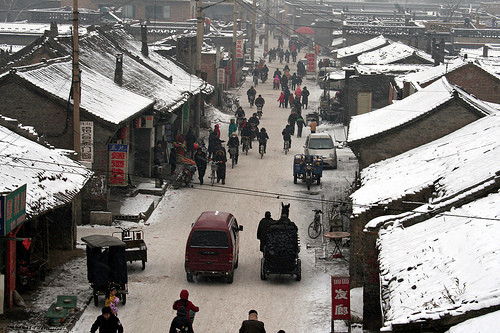Dōngzhì 冬至 - Traditional Food for the Winter Solstice in China
Today, December 22nd, marks the Winter Solstice in China. To celebrate the date Beijing local and long time Hutong School staff member Lao Guo has written an article in Chinese about the traditional food associated with this festival. Just a beginner? Don’t worry, our teacher Ding Yi has translated the article into English for you, so you can follow along no matter your Chinese level.
Dōngzhì – The Winter Solstice in China
Dōngzhì 冬至 (Winter Coming), the Chinese Lunar Calendar festival, began 2500 years ago and usually falls between December 21 and 23. It marks the date of the longest night and shortest day in the Northern hemisphere. This year Dongzhi falls on December 22.
Traditional Food to Be Eaten on Dōngzhì
Húntún miàn
There was an old saying in Beijing, “Dōngzhì húntún, Xiàzhì miàn” meaning Huntun is the food for Dōngzhì and Noodle is the food for Xiàzhì,
the Summer Solstice. Huntun is a kind of dumpling from North China. The name came from the ancient war between Chinese and Tujue, a wild strong minority in the north. There were two leaders of Tujue, one was named Hun Shi
and the other one was named Tun Shi. Because they killed a lot of Chinese at that time and all the Chinese people hated them, they decided to name the dumplings as Huntun.
Dog Meat
China was never a country that loved dogs. Since Han dynasty 2000 years ago, the first emperor Liu Bang used to praise the delicious taste of dog meat, which made eating dog meat popular with the people. Even now, dog meat
is still a lucky food in some areas of China, and is also regarded as a must eat food for Dongzhi.
Dumplings
As an old saying goes ”Shi yue yi, dongzhi dao, jiajia huhu chi shuijiao” means Dōngzhì is coming and it is time to prepare dumplings. Dumplings, as festival food, are very popular in north China
Red Bean Rice
In Jiangnan area, there was a legend that said The son of Gonggong (God of Water) died at Dōngzhì and his ghost caused a horrible disease for which the only cure is red bean. So red bean rice became a healthy food for people
in south China.
According to Chinese Medicine, winter is a time to save energy. Dōngzhì is the beginning of Shujiu (a phrase for 81 days of winter). The most important health advice for this period is to keep warm. That means more hot food,
less cold food, more time at warm places and less going out. Hot foods like jujube, sesame, leek, Chinese black fungus and so on are recommended.
Jiujiu Song
The first and second nine days, never hand out;
The third and fourth nine days, walking on the ice;
The fifth and sixth nine days, appreciate the willow along the river,
The seventh nine days, river’s ice opening and the eighth nine days, swallows flying back, after the ninth nine days, all the farm lands are busy with farm cattle.
Translated by Ding Yi, one of our all star teachers at Hutong School in Shanghai.
Original Article in Chinese
冬至
今年的冬至,是12月22日。
早在二千五百多年前的春秋时代,中国就已经用土圭观测太阳,测定出了冬至,它是二十四节气中最早制订出的一个,时间在每年的阳历12月21日至23日之间,这一天是北半球全年中白天最短、夜晚最长的一天。
冬至养生吃什么
馄饨面
过去老北京有“冬至馄饨夏至面”的说法。相传汉朝时,北方匈奴经常骚扰边疆,百姓不得安宁。当时匈奴部落中有浑氏和屯氏两个首领,十分凶残。百姓对其恨之入骨,于是用肉馅包成角儿,取“浑”与“屯”之音,呼作“馄饨”。
吃狗肉
冬至吃狗肉的习俗据说是从汉始的。相传,汉高祖刘邦在冬至这一天吃了樊哙煮的狗肉,觉得味道特别鲜美,赞不绝口。从此在民间形成了冬至吃狗肉的习俗。现在的人们在冬至这一天吃狗肉、羊肉,以求来年有一个好兆头。
吃饺子
每年农历冬至这天,不论贫富,饺子是必不可少的节日饭。谚云:“十月一,冬至到,家家户户吃水饺。”
红豆糯米饭
在江南水乡,有冬至之夜全家欢聚一堂共吃赤豆糯米饭的习俗。相传,共工氏有不才子,作恶多端,死于冬至这一天,死后变成疫鬼,继续残害百姓。但是,这个疫鬼最怕赤豆,于是,人们就在冬至这一天煮吃赤豆饭,用以驱避疫鬼,防灾祛病。
冬季是健康“储蓄”的最好季节。冬季闭藏,万物休整,神志深藏于内。人在这时只要顺应这一时令,遵循“冬藏”养生之道,做到多“储蓄”、少“透支”,就能健康长寿。
冬至是“数九”的开始,冬至养生的首要任务就是做好防寒保暖。在饮食上以温热为主,如食用糯米、狗肉、大枣、桂圆、芝麻、韭菜、木耳等,少吃冷饮、海鲜等寒性食物;外出时注意保暖,老人在早晚气温较低时尽量少出门,适度保暖、适量运动。
冬至九九歌
(北京)
一九二九不出手;三九四九冰上走;
五九六九沿河看柳;七九河开八九雁来;
九九加一九,耕牛遍地走。
老郭
by Lao Guo
22 Dec 2015